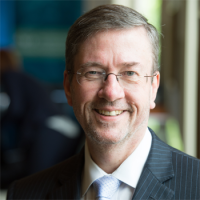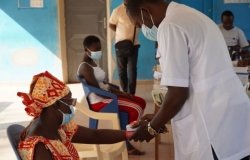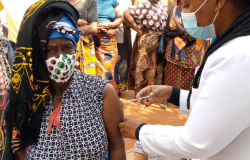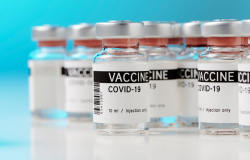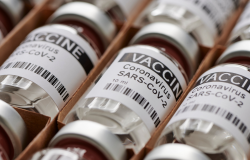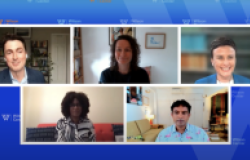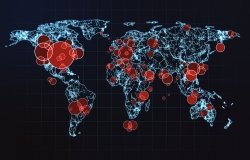Shutterstock/PeterSchreiber.Media
Vaccine Passports: A public health solution or ethical & legal minefield?
Overview
As vaccination speeds up and governments are eager to return to a sense of normalcy, the concept of vaccine passports has gained significant traction among policymakers and business leaders. The EU Commission proposed a “digital green pass” for travel in Europe and the U.S. government is eyeing a similar approach. Vaccine passports or certificates would allow businesses and countries to better track and distinguish between those who are vaccinated and those are not, and give the fully-vaccinated more access to activities that are still deemed problematic (travel, large gatherings such as concerts, sport events, etc.). But vaccine passports are not an easy solution. They come with significant drawbacks that could exacerbate inequality and discrimination against vulnerable groups.
Join us for a discussion with transatlantic experts on April 8, 10AM ET/4PM CET about the prospects for vaccine passports, ethical and legal concerns, and practical ways to implement them.
Quotes
Ron Roozendaal, Dutch Health Ministry
“Trust and interoperability are crucial.”
“What can you expect entering the European Union this Summer? First of all, we will have a unified, interoperable Green Certificate for the EU citizens, and they can show that while entering. (…) What we try to do now is come to an interoperable framework internationally, outside the Union also.”
“Is there debate? Yes, there is a lot of debate in the Union. It’s about trust, mainly. (…) What we try to do is use the digital possibilities to enhance the situation. For example, it is possible to come up with a digital certificate that does not enable persons being tracked around their visits in other countries. You can do that by changing QR-codes every few seconds. You cannot change a QR-code that has been printed on paper. So what we try to do is come up with a more privacy preserving way of doing this in a digital society, to enable people trusting.”
Melinda Mills, University of Oxford
“One thing we plead for are internationally standardized criteria, because we’re a global world.”
“In the UK and the US we have very polarized societies and it’s often connected to civil liberties, and I think we have to really realize how people are seeing this and we have to engage with them about how this isn’t about your rights, this is about protection, and this isn’t about tracking… And, you know, I think we can’t underestimate that narrative.”
“Covid has revealed deep inequalities in many of our societies and we just have to be really clear if there is vaccine hesitancy among certain ethnic groups, or pregnant women don’t get vaccinated or people don’t get tests for different reasons, we really have to clarify (…) what’s in place for those people that aren’t able to do these tests or have a vaccine.”
Deanne Kasim, Change Healthcare
“We realized that privacy and equity were absolutely the things that needed to be preserved for this.”
“We realized (…) that there could be a need for this, similar to your boarding pass, that you have a QR code to get on an airline – but how do we take that to a place which is preserving privacy, that doesn’t live on somebody else’s server and that really is up to the consumer?”
”When the vaccines rolled out we all got our paper card. (…) The whole idea of the credential was to put that white card digital, but also to preserve privacy, and I think that’s something that we have looked to bake into these apps, but as these mature, that continues to be a thread throughout the fabric.”
Brian Behlendorf, Linux Foundation
“There’s been recent advancements in cryptography and mathematics that are much better aligned with this idea of being able to prove a thing without having to show a lot of information about that thing. Kind of the equivalent of if I do go to a concert and I show my driver’s license, the person looking at that license, if they have limited it to people over the age of eighteen, they’re not writing down my birthday – they’re just looking to see ‘is this person over eighteen? Okay, great, they can go in’. That same kind of zero-knowledge system and zero-knowledge proof needs to be something that we standardize across the system and make really meet up with the users’ expectations of how these systems should work. They should work like paper.”
“These passport systems, these pass systems, these wallets, as we prefer to call them, need to be trusted more like the way that consumers trust their mail client or their web browser, than the way that they might trust their Uber app sitting on their phone.”
“If any of these efforts, the health pass and the stuff that we work on at the COVID Credentials initiative come to bear fruit, you will see a second wave of apps that are more interoperable, that are more about management of certificates, about putting more power in the consumer’s hands and true interoperability.”
Speakers
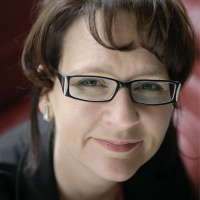
Melinda Mills

Deanne Kasim

Brian Behlendorf

Ron Roozendaal
Hosted By

Global Europe Program
The Global Europe Program is focused on Europe’s capabilities, and how it engages on critical global issues. We investigate European approaches to critical global issues. We examine Europe’s relations with Russia and Eurasia, China and the Indo-Pacific, the Middle East and Africa. Our initiatives include “Ukraine in Europe” – an examination of what it will take to make Ukraine’s European future a reality. But we also examine the role of NATO, the European Union and the OSCE, Europe’s energy security, transatlantic trade disputes, and challenges to democracy. The Global Europe Program’s staff, scholars-in-residence, and Global Fellows participate in seminars, policy study groups, and international conferences to provide analytical recommendations to policy makers and the media. Read more

Science and Technology Innovation Program
The Science and Technology Innovation Program (STIP) serves as the bridge between technologists, policymakers, industry, and global stakeholders. Read more
Thank you for your interest in this event. Please send any feedback or questions to our Events staff.
